French lawmakers debate ban on 'ostensibly' religious clothing in sports competitions

French lawmakers are debating a ban on “ostensibly religious” clothing and symbols in French sporting competitions.
The proposal — backed by the conservative Les Républicains party and to be discussed on Tuesday and Wednesday — would apply to competitions organised by official sports federations and other bodies, including professional leagues and swimming pools.
Until now, federations have had free rein on rules regarding any overtly religious symbols worn by competitors in their disciplines. While the French football and rugby federations have implemented bans on religious signs and clothing, other associations, such as those governing athletics and handball, have not.
“There is a desire to create a community withdrawal by mixing sport and religious practice, which in my opinion is contrary to the practice of sport”, said Michel Savin, the Les Républicains MP who launched the legal proposal.
The proposed bill would also deny access to any part of a sports facility for prayer, stating the practice "would constitute a misuse of its purpose.”
According to an accompanying report, “growing attacks on secularism” and the need to address reports of “radicalisation”, “communitarianism” and “Islamist separatism” in French sports prompted the bill.
The report also states that banning clothing such as sports hijabs would prevent the formation of “counter-societies”.
Critics slam 'hijab ban'
Secularism — known as laïcité in French — is a key part of the country's political fabric but also a source of tension with some parts of the Muslim community.
While the proposal has been welcomed by many French conservative politicians, it has also received international condemnation from figures on the left, as well as human rights groups. Many critics have labelled the proposal as part of a broader “hijab ban” and limits women's rights to choose how to dress.
“All women have the right to choose what to wear. The sports hijab bans in France are yet another measure underpinned by Islamophobia and a patriarchal attempt to control what Muslim women wear. This bill must be rejected”, said Anna Błuś, Amnesty International’s researcher on gender justice in Europe.
“At the Paris Olympics, France’s ban on French women athletes who wear headscarves from competing at the Games drew international outrage”, added Błuś.
France invoked its strict rules on secularism to ban its athletes from wearing religious symbols, including the hijab, during the Paris 2024 Olympics.
This measure sparked a substantial public debate, with French sprinter Sounkamba Sylla going public about her dispute with the Games organising body, which centred around whether she should be allowed to wear a hijab to the opening ceremony.
Sylla was initially banned from attending the Paris Games' opening ceremony, but after discussions, she was allowed to wear a cap instead to cover her hair during the event.
“Just six months on, French authorities are not only doubling down on the discriminatory hijab ban but are attempting to extend it to all sports,” commented Błuś.
In October, United Nations experts condemned these bans as “disproportionate and discriminatory” and called for their reversal.
Today

